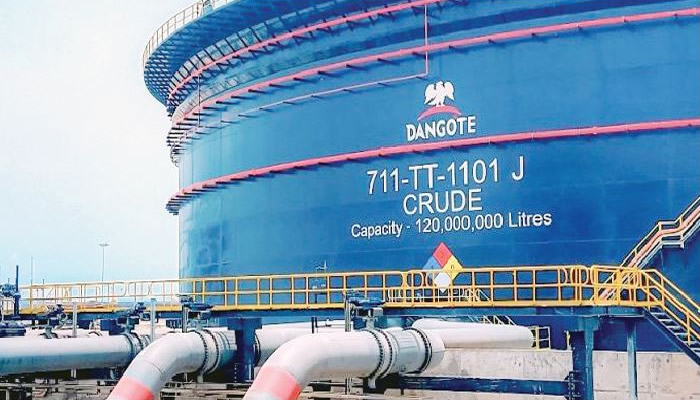In a bid to secure a stable fuel supply and strengthen energy security, Ghana is looking to import petroleum products from Nigeria’s newly inaugurated Dangote Refinery, Africa’s largest single-train refinery. This strategic move, initiated through discussions between Ghanaian officials and the refinery’s management, could provide a reliable source of fuel for Ghana, which has faced supply challenges and fluctuating fuel prices in recent years.
The Dangote Refinery, located in Lagos, Nigeria, has a refining capacity of 650,000 barrels per day and is set to produce a wide range of refined petroleum products, including gasoline, diesel, and jet fuel. With Ghana’s domestic demand for refined products increasing, this partnership could significantly benefit both nations by reducing Ghana’s dependence on distant fuel markets and allowing Nigeria to capitalize on regional energy trade.

The Drive for Energy Security in Ghana
Ghana’s interest in sourcing fuel from the Dangote Refinery aligns with its ongoing efforts to enhance energy security. The country relies heavily on imported petroleum products to meet domestic demand, which has been rising due to economic expansion and population growth. These imports, primarily sourced from European and Asian refineries, are susceptible to international market volatility, impacting fuel prices and availability in Ghana.
In recent years, Ghanaians have experienced sharp increases in fuel prices, driven by exchange rate fluctuations and global supply chain disruptions. Fuel affordability and stability remain key concerns for the Ghanaian government, as high energy costs impact transportation, food prices, and overall cost of living. This has underscored the need for a more sustainable and predictable fuel supply, which a closer partnership with the Dangote Refinery could potentially provide.
Moreover, the partnership could reduce logistics costs for Ghana. Proximity to the Dangote Refinery means that transportation expenses associated with fuel imports may decrease, ultimately benefiting consumers and helping to stabilize local fuel prices.
**The Dangote Refinery’s Role in West Africa’s Energy Landscape**
Commissioned by Nigerian billionaire Aliko Dangote, the Dangote Refinery was developed to address Nigeria’s and West Africa’s reliance on imported refined petroleum products. Despite Nigeria’s status as Africa’s largest crude oil producer, it has historically depended on fuel imports due to limited refining capacity. The Dangote Refinery is expected to change this dynamic by providing a local source of refined products for Nigeria and neighboring countries, including Ghana.
The refinery’s potential impact on regional energy stability has been recognized by various West African nations, many of which are exploring fuel import agreements with Dangote’s facility. By tapping into the Dangote Refinery’s output, these countries could reduce their reliance on overseas refineries and foster a more self-sustained West African energy ecosystem.
In Ghana’s case, the proximity of the Dangote Refinery offers a strategic advantage, enabling the country to diversify its fuel supply sources while reducing logistical and transportation costs. Furthermore, as West Africa’s economies grow and demand for fuel rises, having a major refinery nearby can provide added security against disruptions in global energy supply chains.
**Potential Economic and Social Benefits for Ghana**
An agreement with the Dangote Refinery could yield several economic and social benefits for Ghana. Firstly, more stable fuel prices could mitigate inflationary pressures, particularly in transport and consumer goods sectors, which are directly affected by energy costs. This would enhance overall economic stability and relieve financial pressure on households, many of whom have been affected by the rising cost of living.
Additionally, a reliable and competitively priced fuel supply could benefit Ghana’s industrial sector, where energy costs often represent a significant portion of operational expenses. Manufacturing, mining, and transportation could all experience increased competitiveness and productivity, fostering economic growth and potentially generating new job opportunities.
Ghana’s government could also experience fiscal benefits, as a stable fuel supply reduces the need for subsidies or emergency interventions to shield consumers from price spikes. Any cost savings could be redirected to other priority areas such as healthcare, education, and infrastructure development.
**Challenges and Considerations**
While the potential benefits of importing fuel from the Dangote Refinery are substantial, several considerations must be addressed to ensure a successful partnership. Key among them is the need for a well-defined bilateral trade agreement between Nigeria and Ghana, which would cover pricing, supply logistics, and regulatory compliance. Clear terms would be essential for the sustainable and smooth operation of fuel imports from the refinery.
Additionally, Ghana’s domestic refining ambitions may play a role in the decision-making process. The country has long considered revamping its own Tema Oil Refinery (TOR) to enhance local refining capacity and reduce import dependence. Any long-term agreement with the Dangote Refinery would need to complement, rather than hinder, Ghana’s goals of building its own refining capacity.
Furthermore, logistical arrangements such as fuel storage, distribution, and transportation infrastructure in Ghana would need to be carefully planned to accommodate increased import volumes from Nigeria. Investments in storage facilities and pipelines could be necessary to manage supply efficiently and prevent any disruptions.
**A Strategic Path Forward**
The potential fuel import deal between Ghana and the Dangote Refinery represents a significant step toward regional energy cooperation and self-sufficiency. If successfully implemented, this partnership could enhance energy security for Ghana while solidifying Nigeria’s role as an energy hub in West Africa. As discussions continue, both nations stand to benefit from a closer trade relationship that could drive growth, stability, and prosperity across the region.
Support InfoStride News' Credible Journalism: Only credible journalism can guarantee a fair, accountable and transparent society, including democracy and government. It involves a lot of efforts and money. We need your support. Click here to Donate
